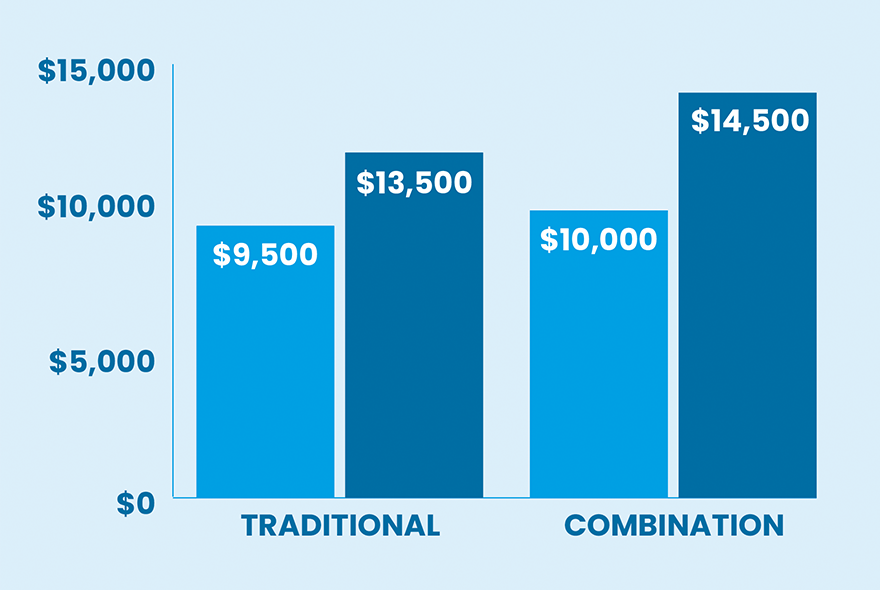Traditional Boilers
A traditional boiler is a heating system that uses either natural gas or oil to heat water. This heated water is then circulated throughout a home or building to provide warmth through radiators or underfloor heating, and to supply hot water for taps and showers. They typically require a separate cylinder to store heated water.
Combination Boilers
Unlike a traditional boiler, a combination boiler—or combi boiler—heats both your central heating and hot water from the same unit. Heatings water on demand, it eliminates the need for a separate hot water cylinder for storage. A combi boiler is compact, making it ideal for smaller homes.
Have specific questions? Check out our FAQ or give us a call today!
Service Details
Diagnosing whether your water boiler needs repair or replacement requires more than surface inspection.
You can check whether your boiler is leaking, damaged, or making unusual noises, but many issues aren’t necessarily visible. If you suspect a problem with your boiler, we recommend Professional Inspection for your safety.
We’ll perform:
- Gas safety checks
- Diagnostic tests to identify any underlying issues
- Internal inspection of components for damage or malfunction
Common Questions About Boilers and the Answers
Yes, we do! Check out our Membership Plans page to see which tier is best for you and what you’ll get.
Several factors can significantly impact the cost of a boiler or combination boiler, including:
- Type of boiler:
- Combination boilers (combi): Typically more expensive than traditional boilers due to their compact design and ability to provide both heating and hot water on demand.
- Conventional boilers: Less expensive upfront, but require a separate hot water cylinder, adding to overall installation space and potentially increasing costs.
- System boilers: Similar to conventional boilers but with some components built in, offering a middle-ground in terms of price.
- Brand and model:
- Premium brands: Often come with higher price tags due to reputation, advanced features, and longer warranties.
- Basic models: More affordable but might lack some of the features and efficiency of premium models.
- Size and capacity:
- BTU output: The boiler’s heating capacity, measured in British Thermal Units (BTUs), directly affects the price. Larger homes require boilers with a higher BTU output, which are more expensive.
- Flow rate: For combi boilers, the flow rate, measured in gallons per minute (GPM), determines how much hot water the boiler can deliver simultaneously. Higher flow rates are usually associated with higher prices.
- Fuel type:
- Gas boilers: Generally the most common and cost-effective option in areas with natural gas infrastructures.
- Oil boilers: Less common and usually more expensive than gas boilers.
- Electric boilers: Often the most expensive option due to higher electricity costs.
- Installation complexity:
- Existing system: If your system is outdated or complex, it might require additional modifications, which will increase installation costs.
- Location: Installing a boiler in a difficult-to-reach location or requiring extensive pipework can add to the labor costs.
- Additional features and upgrades:
- Smart Controls: Boilers with smart thermostats or app controls offer convenience but can add to the overall cost.
- Condensing Technology: High-efficiency condensing boilers are more expensive upfront but can save money on energy bills in the long run.
Warranty: Longer warranties often come with a higher initial price but provide peace of mind and potential savings on future repairs.
Traditional boiler: $9,500-13,500 (unit and installation)
Combination boiler: $10,000-14,500 (unit and installation)

Here’s what you can generally expect during boiler repair or replacement:
Repair:
- Inspection: A qualified technician will thoroughly inspect your boiler to diagnose the issue. They may run tests, check for leaks, and examine internal components.
- Diagnosis: The technician will explain the problem and recommend the necessary repairs.
- Repair work: Depending on the issue, the technician may replace parts, fix leaks, clean components, or adjust settings.
- Testing: After the repairs are complete, the technician will test the boiler to ensure it’s working correctly and safely.
- Clean-up: The technician will meticulously clean up the work area before leaving.
Replacement:
- Assessment and quote: The technician will assess your home’s heating needs and recommend a suitable replacement boiler. You’ll receive a written estimate outlining the costs.
- Scheduling: You’ll schedule a convenient time for the replacement, which may take a few hours or a full day depending on the complexity.
- Old boiler removal: The technician will safely disconnect and remove your old boiler responsibly.
- New boiler installation: The new boiler will be installed, connected to the existing pipework, and tested.
- System flushing: If necessary, the technician may flush the system to remove debris and ensure optimal performance.
- Explanation and demonstration: The technician will explain how the new boiler works and demonstrate its controls.
- Clean-up: The work area will be meticulously cleaned up.
General considerations:
- Timeline: Repairs can often be completed in a few hours, while replacements might take longer depending on the complexity.
- Disruption: Expect some disruption to your hot water and heating during the process.
- Cost: Repairs are generally less expensive than replacements, but a new, more efficient boiler can be a worthwhile investment in the long run.
- Safety: Ensure the technician you hire is qualified and licensed to work on boilers.
- Warranty: Inquire about warranties on parts and labor for both repairs and replacements.
Before the technician arrives:
- Gather information:
- Boiler model and age: Make note of the make, model, and age of your boiler. This information will be helpful for the technician.
- Maintenance records: If you have any past service records, collect them to provide context for the current issue.
- Warranties: Check if your boiler is still under warranty, as it might cover repair or replacement costs.
- Clear access:
- Boiler location: Make sure the area around the boiler is clear of any obstacles, providing easy access for the technician.
- Water and gas shut-off: Locate the water and gas shut-off valves for the boiler. These might need to be turned off during the repair or replacement.
- Note symptoms:
- Problems observed: Clearly describe the issues you’ve experienced with the boiler, including any unusual noises, leaks, error codes, or changes in performance.
- Timeline: Note when the problems started and how they have progressed over time.
This information can help the technician diagnose the issue quicker, and having the area clear will also save you time and money.
Traditional boilers (conventional or system boilers): These typically last 10-15 years, but with good maintenance, they can sometimes reach 20 years or more.
Combi boilers: These also have an average lifespan of 10-15 years, but newer models with high-efficiency condensing technology might have slightly shorter lifespans of around 12-15 years.
Several signs can indicate your boiler needs repair or replacement. Here are some key things to look for and consider:
Signs your boiler might need repair:
- Leaks and unusual noises
- Persistent pilot light issues
- Lack of water pressure
- Thermostat issues
Signs your boiler might need replacement:
- Age (they last 10-15 years on average)
- Frequent repairs
- Rising energy bills
- Carbon monoxide leak
- Outdated model (parts may be unavailable)
*Remember, boilers involve gas and water, so it’s crucial to prioritize safety and consult a professional if you have any concerns.
Service Guarantee + Insured, Bonded, Certified
Quality Guarantee
We stand behind our work and guarantee your satisfaction. Our professional staff is ready to answer your questions, educate you on your plumbing issues, and ensure that you are comfortable with the decisions you make. It’s the bluefrog way!
Insured, Bonded, and Certified
Our plumbers have over 30 years of combined experience unclogging drains, fixing toilets, repairing slab leaks, water lines, sewer lines, and more. We are a fully licensed and insured plumbing company headquartered in Wallingford.
Highly Rated
Having serviced many Connecticut plumbing customers in the last several years, we have established an excellent reputation and are highly rated on many review sites! Check out our reviews and what our customers are saying about us!
Schedule a Boiler or Combination Boiler Repair or Replacement Service Now!
You can reach us at (203) 937-2772 to schedule a combo boiler service for your home or business today from one of our licensed, bonded, and insured plumbing technicians!




